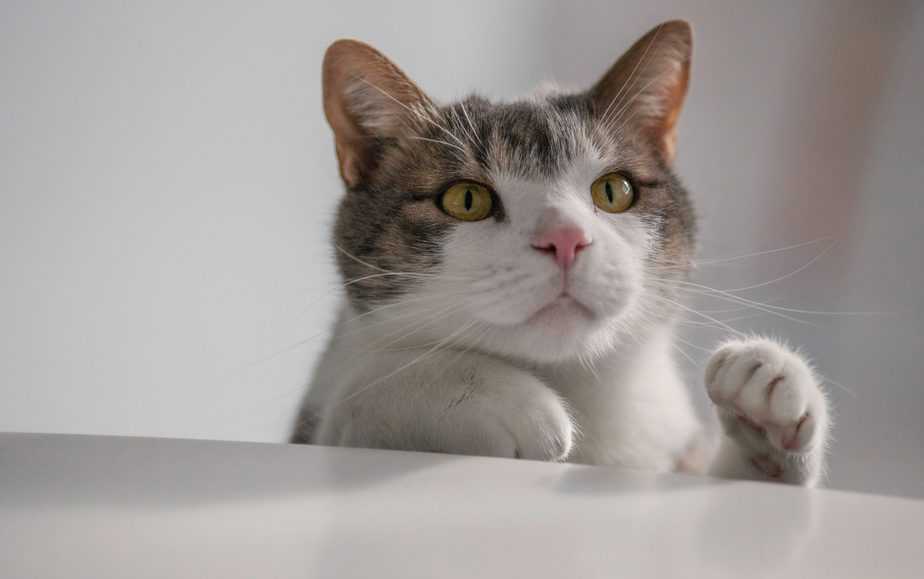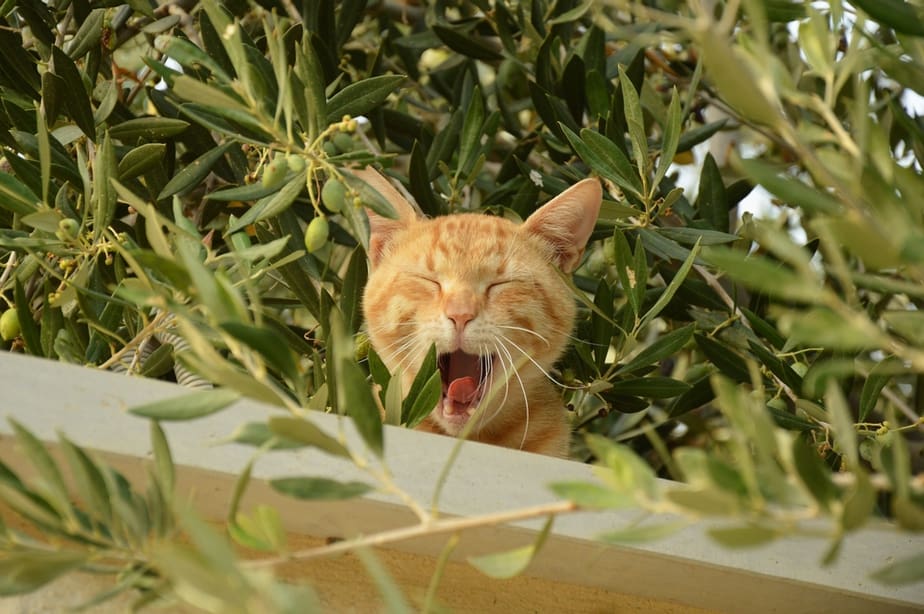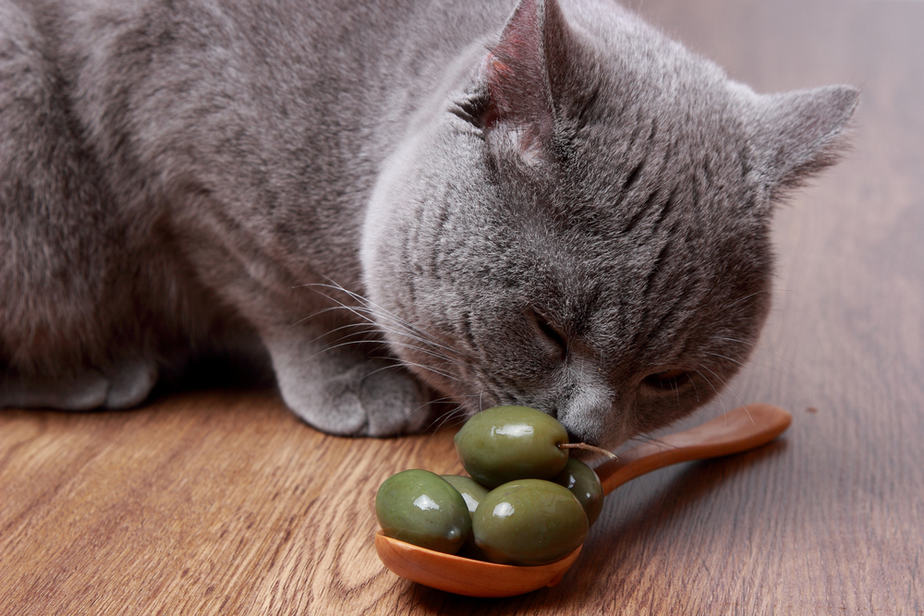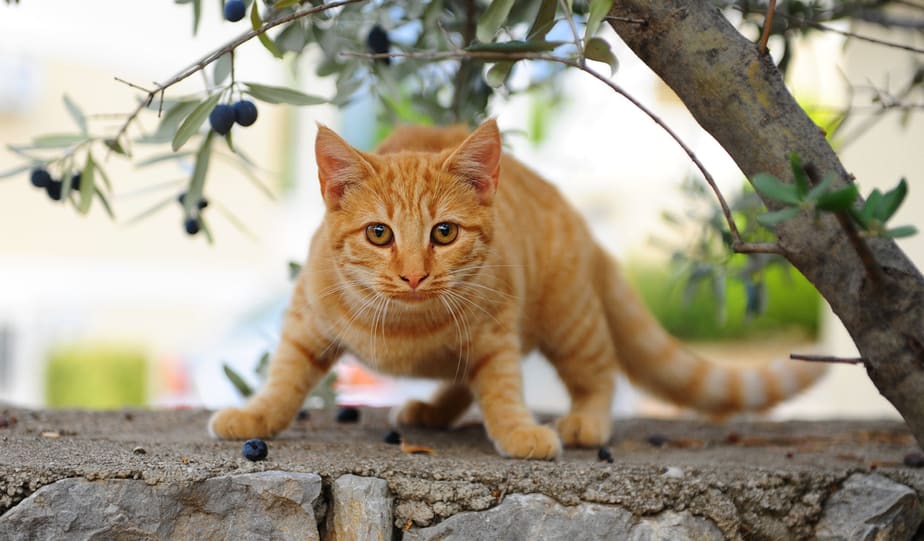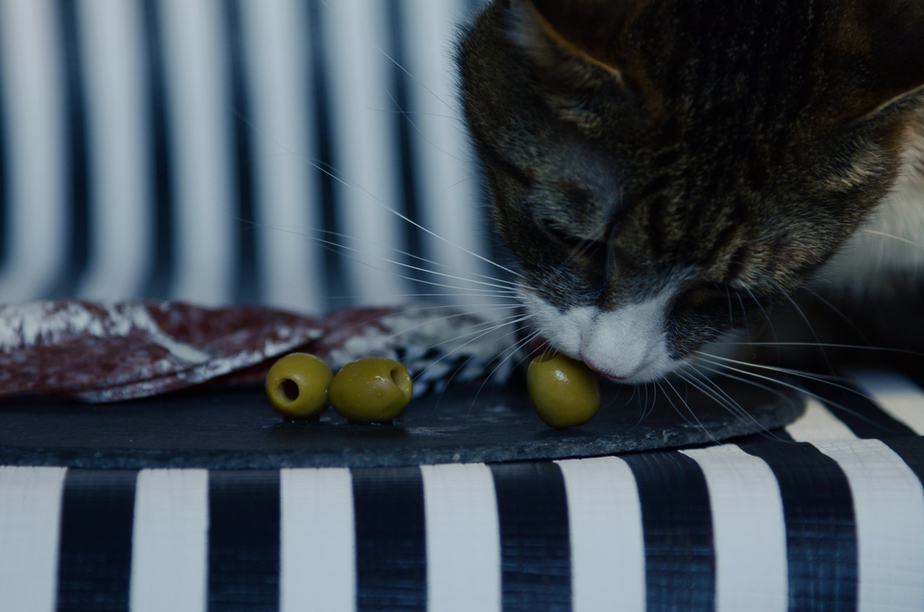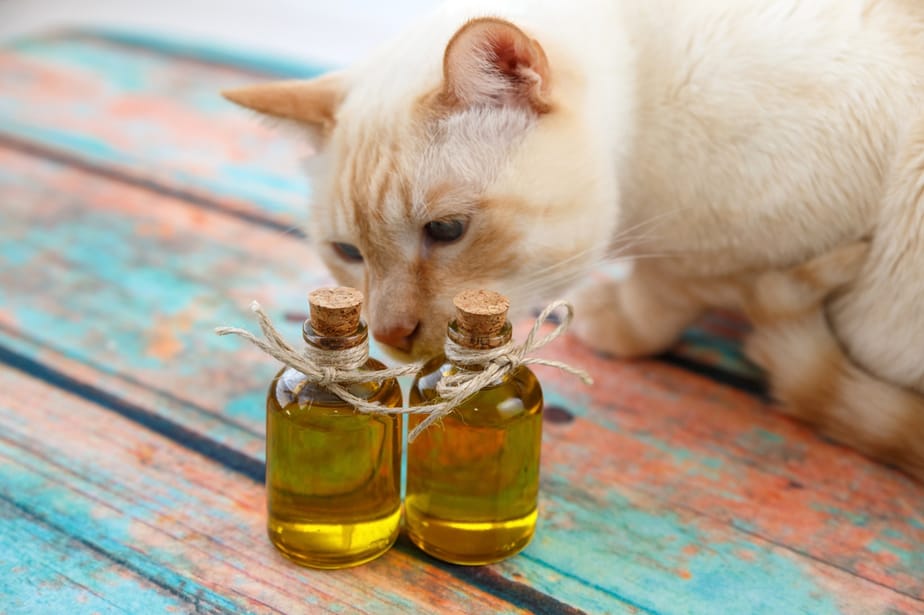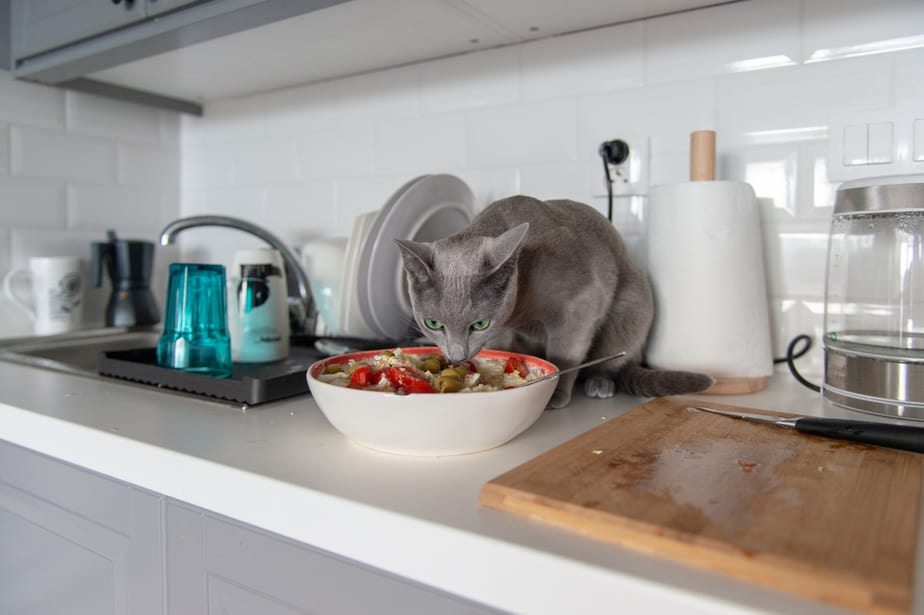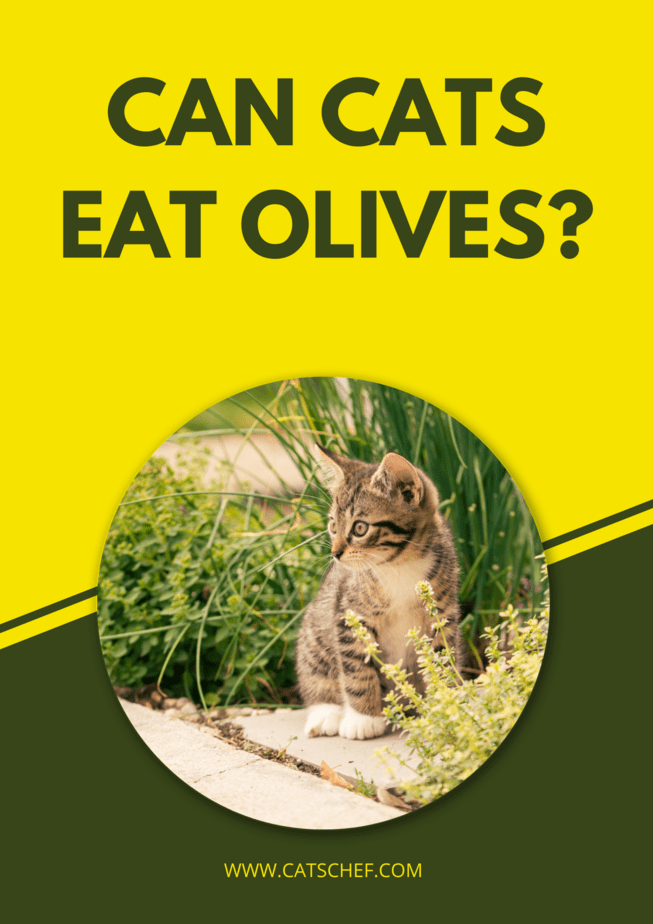📖 Table of Content:
Oh, olives! Whether you love them or hate them, you can’t help but notice that your mischievous monster developed a weird obsession with the briny tang of this fruit. But, can cats eat olives?
Your cat definitely wants to! And who can blame her?! Olives have the perfect shape and they fit right into her tiny paw. This makes them super suitable for chasing around the kitchen. Does that also make them suitable for her tummy?
According to our friends over at the ASPCA (American Society for the Prevention of Cruelty to Animals), olives don’t contain any ingredients that could harm your feline friend. But, that doesn’t mean that you should include this odd-looking morsel in your cat’s diet.
Feeding your four-legged friend with human foods is frowned upon by most veterinarians. This act of what you think is unconditional love comes with heaps of risks and repercussions.
Food allergies, food poisoning, food toxicity, choking hazards… None of that sounds fun, does it? Let’s just say that your question requires a better explanation than a simple yes or no.
So, put your cat’s tendency to steal olives aside and keep reading to learn everything you need to know about this fascinating fruit before making your final decision.
Do cats like olives?
Absolutely, cats love olives! Let’s start from the beginning. Olives are small fruits that grow on olive trees. They belong to the stone fruit family, along with mangoes, peaches, cherries, almonds, and pistachios.
They come in many different shapes, sizes, and types with black olives, green olives, and kalamata olives being the most popular ones.
And, they are incredibly beneficial to humans as they contain heaps of vitamins, minerals, and antioxidants. Riveting information, isn’t it?
Here comes the fun part, though. Olives contain a chemical compound called isoprenoid (and no, you don’t have to memorize the name by heart) which has a similar effect on your four-legged friend as catnip does. One whiff of this stuff and she might go completely crazy!
Granted, cats don’t really enjoy munching on olives as much as they enjoy playing with them, sniffing them, and giving them an occasional bite to release the juices. They also love nibbling on olive wood for the same reason.
But… Before you and your feline friend put on your party hats, you should take a couple of things into consideration. While olives certainly aren’t the worst cat treats out there, they do come with a couple of risks.
So, can cats eat olives?
Repeat after me “Cats are obligate carnivores!” This means that they require heaps of meat, animal protein, and animal-sourced nutrients in their diet in order to survive (and thrive).
While your cat can enjoy an occasional olive treat, that doesn’t mean that she should. Your cat’s digestive system might run into problems trying to digest fruits and veggies. It doesn’t really contain the same enzymes yours does.
What does that mean? Well, let’s say your furry friend decides to have an olive party on your kitchen counter because someone thought it was a good idea to leave an entire jar opened and unsupervised.
She will have a lousy time trying to fend off a bunch of digestive issues including tummy ache, constipation, diarrhea, and vomiting. “That doesn’t sound that bad, I can take the risk if it means I don’t have to say no to my precious purrincess!”
Hold your horses (or even better, hold your cats), because most commercially available olives also contain a lot of salt, additives, preservatives, and other ingredients that can be detrimental to your cat’s health.
So, olives aren’t toxic to cats, but they shouldn’t find their way into your cat’s diet. She might scoff off her regular cat food and cat treats from time to time. But, she’s much better off munching on kibble than choking on a rogue olive pit!
Here’s why shouldn’t feed olives to your cat
Most cat owners come to the conclusion that olives are completely safe for their cats. And that is based on them noticing that the smell of olives makes them go bonkers.
They do a quick Google search, draw the connection between isoprenoid and nepetalactone, remember that “catnip is great”, and voila!
Sure, playing with some olive wood or nibbling on a single unsalted olive over the course of two days won’t send your cat to the emergency animal clinic. But, adding them to your cat’s regular diet will.
And trust me, these odd-looking morsels have no nutritional value and no health benefits that would justify the risk. “Can cats eat olives?” Well, there’s nothing left to do but to figure out the answer to that question together.
1. High sodium content
Your little munchkin loves salty treats because it’s one of the few things she can taste. Cats don’t typically go for olives because they want to munch on them, but… One of the reasons why your cat seems to be drawn to them might be the high sodium content.
Oh, the irony! While your cat might love the taste of high sodium treats, she’s only allowed to consume around 40 milligrams a day.
Just one green olive contains around 110 milligrams of sodium which can easily add up and become quite problematic. While sodium in itself isn’t toxic to cats, too much of it could lead to something called sodium toxicity or sodium poisoning.
Some of the most common symptoms of this scary condition are loss of appetite, upset stomach, excessive thirst and urination, diarrhea, and vomiting. Contact your vet if you have any reason to believe your cat is experiencing symptoms of sodium poisoning.
So, next time you’re looking up “can cats eat olives” or “can cats eat pickles” remember that less salt is always a better choice for your four-legged friend!
2. High fat content
Olives are packed with Omega-9 fatty acids and other unsaturated fats. While you might think to yourself “well, that doesn’t sound bad”, consuming too much fat (regardless of the type) can leave your feline friend with various health issues.
So, what exactly happens when your cat consumes food with a high-fat content over a long period of time? An occasional olive might cause a couple of digestive issues but it shouldn’t lead to any serious diseases.
On the other hand, including olives in your cat’s regular diet might result in various gastrointestinal diseases, diabetes, and obesity.
So, if you’re looking up “can cats eat olives” and “are olives bad for cats”, you might want to throw “can cats eat fat” into the mix, as well!
3. Seasonings, additives, and preservatives
Your precious purrincess doesn’t munch on olives straight from the tree, now does she? Most commercially available olives contain a bunch of seasonings, additives, and preservatives, and here’s why they don’t belong in your cat’s tummy.
Seasonings like salt, pepper, onion powder, and garlic powder might leave your cat feeling irritable, lethargic, and weak. They might lead to an array of digestive issues, and if consumed over a longer period of time, gastrointestinal diseases.
And if that wasn’t enough, most olives are stuffed with pimentos, cheese, and various different nuts. While none of these ingredients are toxic to cats, they still aren’t recommended for feline consumption as they might lead to an upset stomach (or worse).
Lastly, additives and preservatives make for the most detrimental ingredient on this list. While certain types of additives and preservatives are safe for feline consumption, the ones that are typically used in human foods don’t fall under that category.
4. Choking hazard
Most olives come with an olive pit which can get stuck in your cat’s throat. In case you do notice any signs of retching, gagging, coughing, excessive salivation, or distress, contact your vet or rush to the emergency animal clinic.
Your vet might even advise you to try removing the olive pit yourself. Don’t freak out, there are a couple of ways you could do that.
Firstly, you could sweep the inside of your cat’s mouth with your finger to check if you can locate and remove the pit that way. You could also gently open your cat’s mouth and pull her tongue forward to get a better look.
And if you’re unable to remove the olive pit that way, you could also try performing the Heimlich maneuver. So, while you could go out of your way to get a hold of the pitted olives, it’s safe to say you should avoid them altogether.
Can cats eat olive oil?
Believe it or not, cats can eat olive oil. Olive oil is packed with vitamins (vitamin C and vitamin E), minerals (iron, copper, and calcium), and Omega-9 fatty acids which are great for the health of your cat’s skin, coat, and muscle.
Olive oil can also be a great solution when your cat’s having trouble with those pesky hairballs, matted fur, and ear mites.
And as if that wasn’t enough, a drop of olive oil here and there can do wonders for your cat’s digestive system. They pretty much have all the benefits of olives without the risks!
And, there are so many ways in which you can include it in your cat’s diet. Sneak a couple of drops into her kibble to make it softer, surprise her with a can of tuna in soaked olive oil, or treat her with a bite of chicken coated with olive oil. The choice is all yours!
Be careful with the amount, though! Too much olive oil could end up doing more harm than good to your four-legged friend. She could experience digestive issues such as upset stomach, diarrhea, and vomiting.
And if she continues consuming too much olive oil over a long period of time, she could develop some serious diseases such as heart disease, diabetes, and obesity. It’s better to stay on the safe side!
What can cats eat instead of olives?
After everything we’ve discussed, it’s safe to say that you shouldn’t feed olives to your feline friend. Let her have an occasional bite or two, but don’t let her go overboard unless you want her to spend the entire Sunday morning rushing to the litterbox.
“But, she’s such a huge fan of olives and I have no idea how to avoid breaking her tiny little heart!” Don’t worry, olives are one of the most interesting fruits out there, but… That doesn’t mean you can’t get your hands on a cat-friendly alternative.
If your four-legged friend loves olives because of their correlation to her all-time-favorite herb, why not surprise her with a small catnip plant? She can play and roll around in it as much as she wants to without any repercussions. How great is that!?
On the other hand, she might love olives because of their recognizable taste. You could certainly give her a tiny nibble here and there.
Or, you could look into commercially available cat foods and cat treats infused with olive oil. You could also sprinkle a couple of drops of olive oil on her favorite toy!
Last but not least, she might love olives because she loves munching on everything else she sees you put into your mouth. You could try hiding in your pantry while she makes her way around the kitchen sniffing for clues, or…
You could prepare a fruity feast both of you can enjoy together! Throw some mangoes, peaches, nectarines, and persimmons into the bowl and you’re done.
Don’t forget to cut them into paw-sized bites so your precious purrincess doesn’t have to ask for help!
